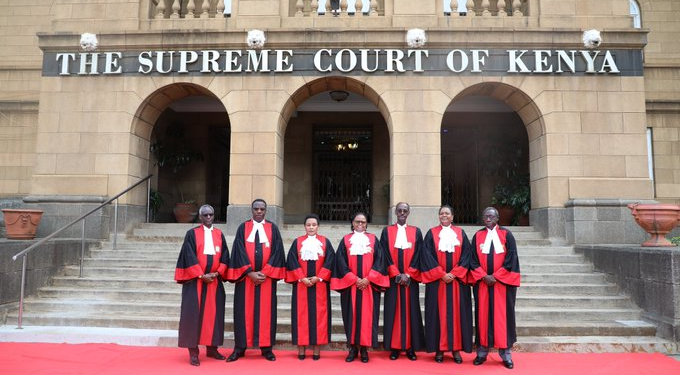
Supreme Court to go for recess on December 21
The recess will end on January 13, 2024.
The Apex court celebrated 12 years of existence in November 2024
In Summary
 Kenya's Supreme Court Judges ahead of 2022 election petition/FILE
Kenya's Supreme Court Judges ahead of 2022 election petition/FILE
As the Kenyan Supreme Court turned 12 in 2024, its journey has been marked by a spectrum of challenges that tested its integrity, resilience, independence, and capacity to deliver justice and uphold the rule of law.
The Court's evolution over this
period demonstrated resilience in the face of political pressures, public
scepticism, and institutional constraints. Chief Justice Martha Koome
has time and again assured Kenyans that the Apex Court will continue to be a
beacon of justice and defender of the rule of law even in the wake of increased
public scrutiny.
Below are some of the highlighted milestones and challenges the Apex Court has faced.
Political interference and independence
One of the most persistent challenges the Supreme Court faced was the political pressure it received during the 2013 and 2017 general election cases.
As the ultimate arbiter of election disputes, the Court became a lightning rod for political actors seeking to either uphold or contest results.
The election disputes are
prime examples of how political interference and expectations from the ruling
elite strained the Court’s credibility.
The Court’s independence was
constantly under scrutiny, with accusations of partisanship despite its mandate
to be neutral.
In 2013, the Supreme Court under Chief Justice Willy Mutunga upheld former President Uhuru Kenyatta’s win, saying the poll was free and fair.
Come
2017, the Supreme Court under Chief Justice David Maraga nullified Uhuru’s
re-election and ordered that fresh polls be conducted in 60 days. Maraga, in
nullifying Uhur’s win said the irregularities compromised the integrity of the
poll.
Immediately after, Uhuru lashed out saying, ‘We shall revisit’ ‘We have a problem with the judiciary and must be fixed."
2. Public trust and perception
The court has also been faced with the challenge of
maintaining public trust, which is somewhat connected to political pressure.
Kenya’s judiciary has for a while struggled with corruption, inefficiency, and slow proceedings, which has led to a general perception that justice could be bought or delayed.
Chief Justice Martha Koome stated during the anniversary held in November this year that the court faces ongoing challenges to judicial independence, stemming not only from other branches of government but also from external groups, which in today's age can exert immense pressure on courts to deliver preferred outcomes.
"Frequently, these groups applaud judicial independence only when judicial decisions align with their expectations," she said.
Her remarks came at a time when Kenyans on X have been using the term 'JurisPESA' coined from the word 'Jurisprudence' alleging that its members have been compromised for financial gain.
Cartoons depicting the scales of justice have also been doing rounds on X with the term 'JurisPESA' appearing in the shadows.
These allegations have raised questions regarding the competency of the third arm of the government which has ultimately led to public outcry and a demand for sweeping reforms.
But the CJ, in response to critics said they do not get drawn into making political decisions.
She instead called on Kenyans to support the Judiciary to become its best.
"We are a reflection of society. With your support and encouragement we can only bring out our best," she said.
Financial independence of judiciaries.
The funding gap remains a challenge which restricts the ability to realize the court's promise of access to justice.
The CJ has been vocal about inadequate judicial funding which has consistently fallen short by nearly 50 percent for the past three financial years. This has limited the court's capacity to meet the expanding demands of the institution.o
During the launch of the SOJAR report, the CJ said that bridging this gap will go a long way in providing comprehensive wellness programs to support their judicial personnel and also meet the needs of a growing caseload and enhance service delivery.
"I don't know whether Kenyans stop to think about the stress judges go through when they are unnecessarily attacked and their work is made almost impossible. We have to ensure the safety and security of our personnel," she said.
Strides
Expansion of access to justice
In line with its constitutional mandate, the Supreme Court has made significant strides in expanding access to justice for all Kenyans.
The Court has been proactive in engaging with marginalized and vulnerable groups, including women, children, and persons with disabilities, ensuring that their rights are protected under the law.
Additionally, the Court has embraced technology by adopting e-filling and virtual hearings to promote access to justice and efficiency in service delivery. They have used technology as an enabler of justice.
Caseload statistics
According to the Supreme Court 12-year Commemorative Book, the Court has made significant strides in fulfilling its role as the highest judicial authority in the country, balancing its workload while delivering justice with a focus on both expediency and quality
Over the past 12 years, the Court handled 734 cases, which include 349 appeals, 17 election petitions, 28 advisory opinions, and 340 applications.
Of these, 690 cases were successfully resolved, comprising 314 appeals, 17 election petitions, 26 advisory opinions, and 333 applications.
As of August 31, 2024, there were 44 pending cases, comprising 35 appeals, 2 advisory opinions, and 7 applications. Importantly, only 7 cases had been in the court system for more than a year.
For advisory opinions, the Court has many requests for advisory opinions, demonstrating its essential role in clarifying constitutional and legal matters.
The Book indicates that the Court’s performance in rendering advisory opinions has varied over the years, with notable highlights in 2012 and 2021, during which it achieved high clearance rates.
In 2023, the Court resolved 3 advisory opinion cases, leaving only 2 pending, thus achieving a 300% clearance rate.

The recess will end on January 13, 2024.